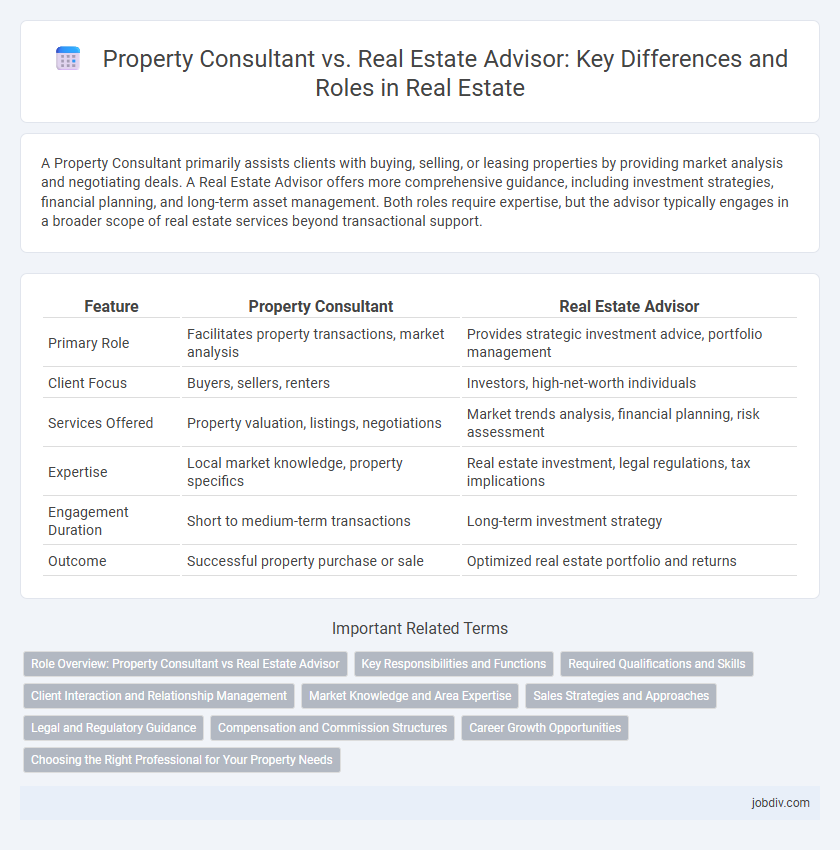A Property Consultant primarily assists clients with buying, selling, or leasing properties by providing market analysis and negotiating deals. A Real Estate Advisor offers more comprehensive guidance, including investment strategies, financial planning, and long-term asset management. Both roles require expertise, but the advisor typically engages in a broader scope of real estate services beyond transactional support.
Table of Comparison
| Feature | Property Consultant | Real Estate Advisor |
|---|---|---|
| Primary Role | Facilitates property transactions, market analysis | Provides strategic investment advice, portfolio management |
| Client Focus | Buyers, sellers, renters | Investors, high-net-worth individuals |
| Services Offered | Property valuation, listings, negotiations | Market trends analysis, financial planning, risk assessment |
| Expertise | Local market knowledge, property specifics | Real estate investment, legal regulations, tax implications |
| Engagement Duration | Short to medium-term transactions | Long-term investment strategy |
| Outcome | Successful property purchase or sale | Optimized real estate portfolio and returns |
Role Overview: Property Consultant vs Real Estate Advisor
A Property Consultant provides tailored advice on buying, selling, or leasing properties, focusing on market analysis, client needs, and investment opportunities to maximize returns. A Real Estate Advisor offers strategic guidance on real estate transactions, portfolio management, and development projects, often working with investors or corporate clients to align property decisions with long-term financial goals. Both roles require deep market knowledge but differ in client focus and scope, with consultants handling individual deals and advisors managing comprehensive real estate strategies.
Key Responsibilities and Functions
Property consultants specialize in conducting market analysis, advising clients on property investment opportunities, and facilitating negotiations to ensure favorable transaction outcomes. Real estate advisors focus on offering strategic guidance throughout the buying, selling, or leasing process, including portfolio management and risk assessment. Both roles require in-depth knowledge of real estate market trends, legal regulations, and client-specific financial goals.
Required Qualifications and Skills
Property consultants typically require a background in real estate, sales, or marketing, alongside strong interpersonal and negotiation skills to effectively connect buyers with suitable properties. Real estate advisors often possess advanced certifications such as Certified Real Estate Advisor (CREA) and demonstrate expertise in market analysis, financial acumen, and regulatory compliance. Both roles demand excellent communication abilities, client management experience, and a thorough understanding of property laws and local market trends.
Client Interaction and Relationship Management
Property Consultants emphasize proactive client interaction by providing tailored market insights and comprehensive property evaluations, fostering trust through personalized service. Real Estate Advisors concentrate on long-term relationship management, leveraging extensive industry networks to align client goals with strategic investment opportunities. Both roles prioritize effective communication to enhance client satisfaction and secure successful real estate transactions.
Market Knowledge and Area Expertise
Property Consultants typically possess in-depth market knowledge with a focus on property valuation, investment potential, and pricing trends to guide clients in making informed decisions. Real Estate Advisors offer extensive area expertise, incorporating local neighborhood insights, community development plans, and demographic trends to provide tailored advice for long-term property strategies. Both roles emphasize market intelligence, but Property Consultants prioritize financial analytics while Real Estate Advisors concentrate on localized contextual understanding.
Sales Strategies and Approaches
Property consultants emphasize personalized sales strategies by conducting in-depth market analysis to tailor property recommendations, focusing on client needs and investment potential. Real estate advisors prioritize long-term portfolio growth through strategic planning, risk assessment, and leveraging industry networks to identify exclusive property opportunities. Both professionals utilize negotiation techniques and client relationship management but differ in approach: consultants drive immediate sales, while advisors focus on sustained asset appreciation and financial planning.
Legal and Regulatory Guidance
A Property Consultant primarily assists clients with market analysis and property valuation, while a Real Estate Advisor specializes in providing comprehensive legal and regulatory guidance throughout property transactions. Real Estate Advisors ensure compliance with zoning laws, contract stipulations, and local real estate regulations to mitigate legal risks. Their expertise is crucial for navigating complex statutory requirements and securing title clearances during property acquisitions.
Compensation and Commission Structures
Property consultants typically earn a fixed salary combined with performance bonuses, while real estate advisors often rely heavily on commission-based compensation tied directly to property sales and lease deals. The commission structure for real estate advisors may include tiered percentages that increase with higher sales volumes, incentivizing greater deal closures. In contrast, property consultants may receive steady income with occasional bonuses, making their compensation less variable but potentially lower in high-performing markets.
Career Growth Opportunities
Property consultants often start with sales-focused roles that provide foundational industry experience, leading to opportunities in property management and client advisory services. Real estate advisors typically engage with higher-level market analysis and investment strategies, positioning themselves for advanced roles in portfolio management and strategic consulting. Both career paths offer upward mobility, but real estate advisors usually experience faster growth due to their specialized expertise in financial and market trends.
Choosing the Right Professional for Your Property Needs
Property consultants provide comprehensive market analysis and strategic advice tailored to your investment goals, specializing in property valuation and market trends. Real estate advisors focus on personalized client relationships, offering guidance on property transactions, legal considerations, and financing options. Selecting the right professional depends on whether you seek data-driven insights or hands-on support throughout buying, selling, or investing in real estate.
Property Consultant vs Real Estate Advisor Infographic

 jobdiv.com
jobdiv.com